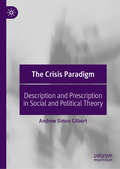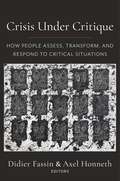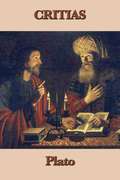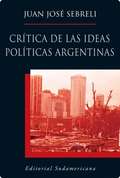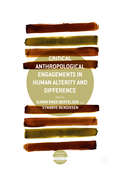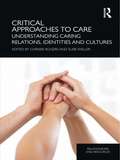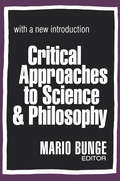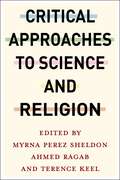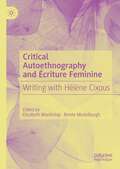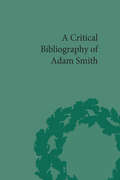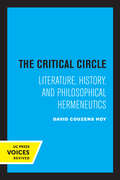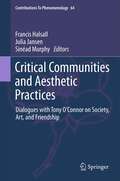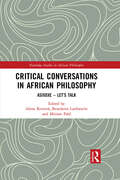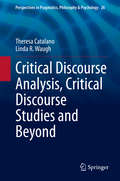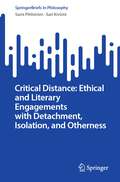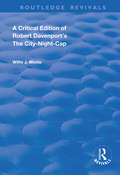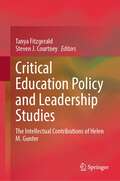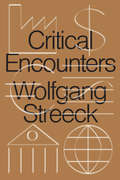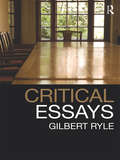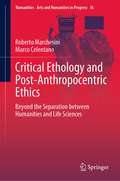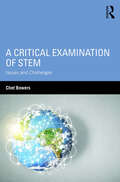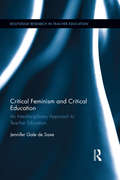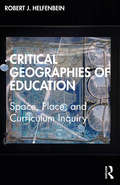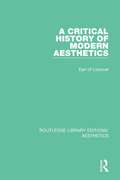- Table View
- List View
The Crisis Paradigm: Description and Prescription in Social and Political Theory
by Andrew Simon GilbertThis book examines how 20th century theorists have used a discourse of “crisis” to frame their conceptualizations of modernity. Through an investigation of four key thinkers (Georg Lukács, Hannah Arendt, Reinhart Koselleck and Jürgen Habermas), Gilbert argues that scholars in the social sciences and humanities should be cautious of treating crises as explananda for research. Instead, the book calls for sociological analysis of the role of “crisis” within social scientific discourse, and examines how “crisis” has been used as a conceptual frame for legitimating theoretical agendas. Gilbert’s “sociology of concepts” approach presents crisis as a paradigm of modern thought, and, more generally, reflects on how concepts can become the carriers of diverse intellectual traditions and debates. The Crisis Paradigm will be of interest to students and scholars of social and critical theory, politics, sociology and history, as well as those working in the fields of media studies, communication and discourse analysis.
Crisis Under Critique: How People Assess, Transform, and Respond to Critical Situations (New Directions in Critical Theory #78)
by Fassin, Didier; Honneth, AxelThe word “crisis” denotes a break, a discontinuity, a rupture—a moment after which the normal order can continue no longer. Yet our political vocabulary today is suffused with the rhetoric of crisis, to the point that supposed abnormalities have been normalized. How can the notion of crisis be rethought in order to take stock of—and challenge—our understanding of the many predicaments in which we find ourselves?Instead of diagnosing emergencies, Didier Fassin, Axel Honneth, and an assembly of leading thinkers examine how people experience, interpret, and contribute to the making of and the response to critical situations. Contributors inquire into the social production of crisis, evaluating a wide range of cases on five continents through the lenses of philosophy, sociology, anthropology, political science, history, and economics. Considering social movements, intellectual engagements, affected communities, and reflexive perspectives, the book foregrounds the perspectives of those most closely involved, bringing out the immediacy of crisis. Featuring analysis from below as well as above, from the inside as well as the outside, Crisis Under Critique is a singular intervention that utterly recasts one of today’s most crucial—yet most ambiguous—concepts.
Critias
by PlatoCritias, one of Plato's late dialogues, contains the story of the mighty island kingdom Atlantis and its attempt to conquer Athens. Critias is the second of a projected trilogy of dialogues, preceded by Timaeus and followed by Hermocrates, though the latter was possibly never written and Critias was left incomplete.
Crítica de las ideas políticas argentinas
by Juan José SebreliSebreli enfrenta en este libro temas como el liberalismo conservador, elnacionalismo y el Che Guevara. Analiza cada uno de ellos con unafervorosa neutralidad intelectual y logra por lo tanto inventariar yevaluar un complejo conjunto de avances y regresos, de decisiones einercias, de moderados éxitos y apabullantes fracasos que llevó más deun siglo. Sebreli traza un panorama completo de las ideas del siglo XX en laArgentina y descubre así continuidades y rupturas que otrosintelectuales y otras escuelas de pensamiento han pasado poralto. Interroga ideas, personajes, estilos y circunstancias políticas ehistóricas y produce un efecto a la vez torrencial y definitivo. El paíspromisorio que llega hasta los treinta y la nación decadente que desdeentonces empieza a hacerle sombra tienen el mismo origen y el mismodestino; la compleja red de arrogancia e inconclusiones que empaña eldiscurso y frustra los más fervorosos anhelos, también. Estamos ante unfenómeno que solo un observador acostumbrado a ciertas falsassingularidades y ciertas imperceptibles semejanzas puede detectar.
Critical Anthropological Engagements in Human Alterity and Difference (Approaches to Social Inequality and Difference)
by Bjørn Enge Bertelsen Synnøve BendixsenThis book explores how one measures and analyzes human alterity and difference in an interconnected and ever-globalizing world. This book critically assesses the impact of what has often been dubbed 'the ontological turn' within anthropology in order to provide some answers to these questions. In doing so, the book explores the turn's empirical and theoretical limits, accomplishments, and potential. The book distinguishes between three central strands of the ontological turn, namely worldviews, materialities, and politics. It presents empirically rich case studies, which help to elaborate on the potentiality and challenges which the ontological turn's perspectives and approaches may have to offer.
Critical Approaches to Care: Understanding Caring Relations, Identities and Cultures (Relationships and Resources)
by Chrissie Rogers Susie WellerWhat does ‘care’ mean in contemporary society? How are caring relationships practised in different contexts? What resources do individuals and collectives draw upon in order to care for, care with and care about themselves and others? How do such relationships and practices relate to broader social processes? Care shapes people’s everyday lives and relationships and caring relations and practices influence the economies of different societies. This interdisciplinary book takes a nuanced and context-sensitive approach to exploring caring relationships, identities and practices within and across a variety of cultural, familial, geographical and institutional arenas. Grounded in rich empirical research and discussing key theoretical, policy and practice debates, it provides important, yet often neglected, international and cross-cultural perspectives. It is divided into four sections covering: caring within educational institutions; caring amongst communities and networks; caring and families; and caring across the life-course. Contributing to broader theoretical, philosophical and moral debates associated with the ethics of care, citizenship, justice, relationality and entanglements of power, Critical Approaches to Care is an important work for students and academics studying caring and care work in the fields of health and social care, sociology, social policy, anthropology, education, human geography and politics.
Critical Approaches to Science and Philosophy
by Mario BungeThis collection of essays, written on four continents by scientists, philosophers and humanists, was initially presented to Karl R. Popper on his sixtieth birthday as a token of critical admiration and in recognition of his work. But the volume also stands on its own as a remarkable series of statements utilizing Popper's critical vision in the study of philosophy proper, logic, mathematics, science as method and theory, and finally to the study of society and history. What is remarkable is that Popper worked in all of these areas, not in a cursory or discursive way, but with the utmost clarity and rigor.. The core position of this volume and its contributors is that the progress of knowledge is not a linear accumulation of definitive acquisitions but a zigzagging process in which counterexamples and unfavorable evidence ruin generalizations and prompt the invention of more comprehensive and sometimes deeper generalizations, to be criticized in their turn. A critical approach to problems, procedures, and results in every field of inquiry is therefore a necessary condition for the continuance of progress.The title of this volume then is, in a sense, an homage to Popper's critical rationalism and critical empiricism. The essays are a tribute to his unceasing and uncompromising quest, not for final certainty, but for closer truth and increased clarity. Among the contributors are outstanding figures in philosophy and the exact sciences in their own right, including Herbert Feigl, R. M. Hare, J.O. Wisdom, Nicholas Rescher, David Bohm, Paul K. Feyerabend, F. A. Hayek, and Adolf Grunbaum. Social science contributions include Hans Albert on social science and moral philosophy, W. B. Gallie, on the critical philosophy of history, Pieter Geyl on The Open Society and its Enemies, and George H. Nadel on the philosophy of History.
Critical Approaches to Science and Religion
by Sheldon, Myrna Perez; Ragab, Ahmed; Keel, TerenceCritical Approaches to Science and Religion offers a new direction for scholarship on science and religion that examines social, political, and ecological concerns long part of the field but never properly centered. The works that make up this volume are not preoccupied with traditional philosophical or theological issues. Instead, the book draws on three vital schools of thought: critical race theory, feminist and queer theory, and postcolonial theory. Featuring a diverse array of contributors, it develops critical perspectives by examining how histories of empire, slavery, colonialism, and patriarchy have shaped the many relationships between science and religion in the modern era. In so doing, this book lays the groundwork for scholars interested in speaking directly to matters such as climate change, structural racism, immigration, health care, reproductive justice, and sexual identity.
Critical Authoethnography and Écriture Feminine: Writing with Hélène Cixous
by Elizabeth Mackinlay Renée MickelburghThe project offers a collection of new interdisciplinary critical autoethnographic engagements with Hélène Cixous écriture feminine and work Three steps on the ladder of writing. Critical autoethnography shares a reciprocal, and inter-animating relationship with Hélène Cixous’ écriture feminine (“feminine writing”), and in this collection authors explore that inter-animation by explicitly engaging with Three steps on the ladder of writing. Three steps is a poetic, insightful, and ultimately moving reflection on the writing process and explores three distinct areas essential for writing: The School of the Dead—the notion that something or someone must die in order for good writing to be born; The School of Dreams—the crucial role dreams play in literary inspiration and output; and The School of Roots—the importance of depth in the 'nether realms' in all aspects of writing. Topics covered include: ways Cixous’ work can address the need for loss and reparation in writing critical autoethnography, how Cixous’ writing “makes our body speak” through concepts of birth and the body in, through and of critical autoethnography, whether writing in this way recast and reform prevailing orders of domination and oppression, and how Cixous’ writing around the ethics of loving and giving translates into response-able and non-violent forms of critical autoethnography in relation to otherness and difference. In this collection, we invite you to “Let us go to the school of [critical autoethnographic] writing” (Cixous, 1993, p. 3) with the work of Hélène Cixous, and speak in a different way and through a different medium of academic language, in an approach that reveals the tensions, the paradoxes, the pains and the pleasures of writing with critical autoethnography in the contemporary university.
A Critical Bibliography of Adam Smith
by Hiroshi MizutaThis critical bibliography of Adam Smith takes as its starting point the Kress Library of Business and Economics’ 1939 catalogue of its Vanderblue Collection of Smithiana. Since the bicentenary of The Wealth of Nations in 1976, the rate of international publication markedly accelerated, significantly extending the scope of this bibliography beyond 1939. Its scope has been further enlarged via the inclusion of essays on the diffusion process while the inclusion of all works in the chronological main bibliography gives an overview of the scope of this process. The notes appended to the entries provide a running commentary to the gathering pace of publication and the entries are organised chronologically with systematic annotation throughout.
The Critical Circle: Literature, History, and Philosophical Hermeneutics
by David Couzens HoyThe Critical Circle investigates the celebrated hermeneutic circle, especially as it manifests itself in historical inquiry and literary criticism. Formulated variously in different theories of hermeneutics, the circle generally describes how, in the process of understanding an interpretation, part and whole are related in a circular way: in order to understand the while, it is necessary to understand the parts, while to understand the parts it is necessary to have some comprehension of the whole. --from the Foreword This title is part of UC Press's Voices Revived program, which commemorates University of California Press’s mission to seek out and cultivate the brightest minds and give them voice, reach, and impact. Drawing on a backlist dating to 1893, Voices Revived makes high-quality, peer-reviewed scholarship accessible once again using print-on-demand technology. This title was originally published in 1982.
Critical Communities and Aesthetic Practices: Dialogues with Tony O’Connor on Society, Art, and Friendship (Contributions To Phenomenology #64)
by Sinéad Murphy Francis Halsall Julia JansenCritical Communities and Aesthetic Practices brings together eminent international philosophers to discuss the inter-dependence of critical communities and aesthetic practices. Their contributions share a hermeneutical commitment to dialogue, both as a model for critique and as a generator of community. Two conclusions emerge: The first is that one's relationships with others will always be central in determining the social, political, and artistic forms that philosophical self-reflection will take. The second is that our practices of aesthetic judgment are bound up with our efforts as philosophers to adapt ourselves and our objects of interest to the inescapably historical and indeterminate conditions of experience. The papers collected here address the issue that critical communities and aesthetic practices are never politically neutral and can never be abstracted from their particular contexts. It is for this reason that the contributors investigate the politics, not of laws, parties or state constitutions, but of open, indefinably critical communities such as audiences, peers and friends. Critical Communities and Aesthetic Practices is distinctive in providing a current selection of prominent positions, written for this volume. Together, these comprise a pluralist, un-homogenized collection that brings into focus contemporary debates on critical and aesthetic practices.
Critical Conversations in African Philosophy: Asixoxe - Let's Talk (Routledge Studies in African Philosophy)
by Alena RettováIn this edited collection contributors examine key themes, sources and methods in contemporary African Philosophy, building on a wide-ranging understanding of what constitutes African philosophy, and drawing from a variety of both oral and written texts of different genres. Part one of the volume examines how African philosophy has reacted to burning issues, ranging from contemporary ethical questions on how to integrate technological advancements into human life; to one of philosophy’s prime endeavours, which is establishing the conditions of knowledge; to eternal ontological and existential questions on the nature of being, time, memory and death. Part two reflects on the (re)definition of philosophy from an African vantage point and African philosophy’s thrust to create its own canon, archive and resources to study African concepts, artefacts, practices and texts from the perspective of intellectual history. The volume aims to make a contribution to the academic debate on African philosophy and philosophy more broadly, challenging orthodox definitions and genres, in favour of a broadening of the discipline’s self-understanding and locales. This book will be of interest to students and scholars of African philosophy and comparative philosophy.
Critical Discourse Analysis, Critical Discourse Studies and Beyond (Perspectives in Pragmatics, Philosophy & Psychology #26)
by Linda R. Waugh Theresa CatalanoThis book explores the problem-oriented interdisciplinary research movement comprised of Critical Discourse Analysis (CDA) and Critical Discourse Studies (CDS) for scholars, teachers, and students from many backgrounds. Beginning with a Preface by renowned CDA/CDS scholar Ruth Wodak, it introduces CDA/CDS through examples of what its research looks like, delineates various precursors to CDA/CDS and important foundational concepts and theories, and traces its development from its early years until it became established. After the relationship between CDA and CDS is discussed, seven commonly cited approaches to CDA/CDS are outlined, including their connections and differences, their origins and development, major and associated scholars, research focus(es), and central concepts and distinguishing features. After a summary of critiques of CDA/CDS and responses by CDA/CDS scholars, the book provides an overview of its salient connections to other interdisciplinary areas of scholarship such as critical applied linguistics, education, anthropology/ ethnography, sociolinguistics, gender studies, queer linguistics, pragmatics and ecolinguistics. The final chapter describes how scholars use their knowledge of CDA/CDS to make a difference in the world.
Critical Distance: Ethical and Literary Engagements with Detachment, Isolation, and Otherness (SpringerBriefs in Philosophy)
by Sami Pihlström Sari KivistöThis book argues that no ethically appropriate relation to other human beings is possible unless we treat them as genuinely other. The authors provide reasons to be critical of various attempts, many of them popular in our contemporary (Western) culture, to encourage deeper attachment to and immersion into others’ lives and experiences. They defend the significance of the distance between human beings, criticizing exaggerated uses of, e.g., the concept of empathy and related concepts in academic as well as more popular ethical contexts, across a range of issues from the nature of ethical duty to the philosophy of love. The chapters offer non-technical philosophical and cultural criticism through selected perspectives on the continuum between closeness and distance, exploring various aspects of ethically significant relations between human beings. This book thus appeals to a wide audience, especially researchers and students in different fields of the humanities, including philosophy, literary studies, and cultural studies, by combining philosophical and literary methodologies in a humanistic examination of the value of distance. The book also argues that we have to be able to abstract from the concrete other in ethical relations, living in the normative and rational sphere of duty instead of emotional immersion.
Critical Ecologies
by Andrew BiroEnvironmental movements are the subject of increasingly rigorous political theoretical study. Can the Frankfurt School's critical frameworks be used to address ecological issues, or do environmental conflicts remain part of the "failed promise" of this group? Critical Ecologies aims to redeem the theories of major Frankfurt thinkers--Theodor Adorno, Max Horkheimer, and Herbert Marcuse, among others--by applying them to contemporary environmental crises.Critical Ecologies argues that sustainability and critical social theory have many similar goals, including resistance to different forms of domination. Like the Frankfurt School itself, the essays in this volume reflect a spirit of interdisciplinarity and draw attention to intersections between environmental, socio-political, and philosophical issues. Offering textual analyses by leading scholars in both critical theory and environmental politics, Critical Ecologies underscores the continued relevance of the Frankfurt School's ideas for addressing contemporary issues.
A Critical Edition of Robert Davenport's The City Night-Cap (Routledge Revivals)
by Robert DavenportOriginally published in 1979, this volume includes the full, edited, 1661 play of Robert Davenport, 'The City Night-Cap', alongside textual notes, including an introduction on the man and his works, theatrical history, characterization, theme and structure, and setting.
Critical Education Policy and Leadership Studies: The Intellectual Contributions of Helen M. Gunter
by Tanya Fitzgerald Steven J. CourtneyThis edited collection is a Festschrift to Helen M. Gunter, a leading scholar in the field of education policy and leadership. We draw on the concept of the Festschrift as a collection of papers, or chapters, that recognise, honour, and celebrate the work and contributions of an esteemed academic. Gunter’s work has opened up the field of critical education policy and leadership studies and provoked, if not revitalised, scholarly thinking about the origins, structures, patterns and impact of the field. Gunter’s personal commitment to intellectual leadership of the field and public education resonates across all her scholarly works. The core intention of this unique collection is to recognise Gunter’s scholarly contributions as an academic, practitioner and public intellectual. Invited authors have been asked to reflect critically on ways in which Gunter’s work and intellectual support have influenced their own research, teaching and academic engagement. In their reflections, contributors not only speak to the intellectual work of Gunter but suggest how they have taken this work forward and how this has advanced the field of education as well as the production of knowledge.
Critical Encounters: Capitalism, Democracy, Ideas
by Wolfgang StreeckAn anthology of long-read book reviews by one of the European left&’s foremost political economistsFrom the acclaimed author of How Will Capitalism End? comes an omnibus of long-form critical essays engaging with leading economists and thinkers. Critical Encounters draws on Wolfgang Streeck&’s inimitable writing for the London Review of Books and New Left Review, among other publications. It opens with treatments of two contrasting historical eras—factory capitalism and financialization—and three of the world&’s major economies: the United States, France and Germany. A middle section surveys the hollowing out of Western democracies and reviews Yanis Varoufakis&’s &“strange but indispensable&” memoir of the eurozone crisis. Delving into the world of ideas, Streeck discusses the work of Quinn Slobodian, Mark Blyth, Jürgen Habermas and Perry Anderson. Finally, he zooms out to compare his home discipline of sociology to natural history, giving a remarkable and non-deterministic reading of Charles Darwin. In the preface, Streeck reflects on the art (or craft) of book reviewing and the continuing merits of the book form. Critical Encounters also includes a series of &“Letters from Europe,&” penned as the coronavirus descended upon the Continent.
Critical Essays: Collected Papers Volume 1
by Gilbert RyleGilbert Ryle was one of the most important and controversial philosophers of the Twentieth century. Long unavailable, Critical Essays: Collected Papers Volume 1 includes many of Ryle’s most important and thought-provoking papers. This volume contains 20 critical essays on the history of philosophy, with writing on Plato, Locke and Hume as well as important chapters on Russell and Wittgenstein. It also includes three essays on phenomenology, including Ryle’s famous review of Martin Heidegger’s Being and Time first published in 1928. Although Ryle believed phenomenology ‘will end in self-ruinous subjectivism or in a windy mysticism’ his review also acknowledged that Heidegger was a thinker of great originality and importance. While surveying the developments in the philosophy of language and philosophical logic, Ryle sets out his own conception of the philosophers’ role against that of his predecessors and contemporaries. Together with the second volume of Ryle’s collected papers Collected Papers Volume 2 and the new edition of The Concept of Mind, all published by Routledge, these outstanding essays represent the very best of Ryle’s work. Each volume contains a substantial introduction by Julia Tanney, and both are essential reading for any student of twentieth-century philosophies of mind and language. Gilbert Ryle (1900 -1976) was Waynflete Professor of Metaphysics and Fellow of Magdalen College Oxford, an editor of Mind, and a president of the Aristotelian Society. Julia Tanney is Senior Lecturer at the University of Kent, and has held visiting positions at the University of Picardie and Paris-Sorbonne.
Critical Ethology and Post-Anthropocentric Ethics: Beyond the Separation between Humanities and Life Sciences (Numanities - Arts and Humanities in Progress #16)
by Roberto Marchesini Marco CelentanoThe primary purpose of this book is to contribute to an overcoming of the traditional separation between humanties and life sciences which, according to the authors, is required today both by the developments of these disciplines and by the social problems they have to face. The volume discusses the theoretical, epistemological and ethical repercussions of the main acquisitions obtained in the last decades from the behavioral sciences. Both the authors are inspired by the concept of a “critical ethology”, oriented to archive the nature/culture and human/animal dichotomies. The book proposes a theoretical and methodological restructuring of the comparative study of the animal behavior, learning, and cultures, focused on the fact that thought, culture and language are not exclusively human prerogatives. The proposed analysis includes a critique of speciesism and determinism in the ethical field, and converge with the Numanities, to which the series is dedicated, on a key point: it is necessary to arrive at an education system able to offer scientific, social and ethical skills that are trasversal and transcendent to the traditional humanities/life sciences bipartition. Skills that are indispensable for facing the complex challenges of the contemporary society and promoting a critical reflection of humanity on itself.
A Critical Examination of STEM: Issues and Challenges (Sociocultural, Political, and Historical Studies in Education)
by Chet BowersThis critical examination of STEM discourses highlights the imperative to think about educational reforms within the diverse cultural contexts of ongoing environmental and technologically driven changes. Chet Bowers illuminates how the dominant myths of Western science promote false promises of what science can achieve. Examples demonstrate how the various science disciplines and their shared ideology largely fail to address the ways metaphorically layered language influences taken-for-granted patterns of thinking and the role this plays in colonizing other cultures, thus maintaining the myth that scientific inquiry is objective and free of cultural influences. Guidelines and questions are included to engage STEM students in becoming explicitly aware of these issues and the challenges they pose.
Critical Feminism and Critical Education: An Interdisciplinary Approach to Teacher Education (Routledge Research in Teacher Education)
by Jennifer Gale De SaxeChallenging the current state of public education and teacher preparation, this book argues for a re-imagination of teacher education through a critical feminist and critical education perspective. Offering a rich discussion of the promise and pedagogy of self-reflexivity and testimonio, which emerges from critical feminism, this book brings together theory and practice in critical feminism, critical education, and testimonio to serve as a platform in which to reconceptualize the philosophy of traditional teacher education, arguing that too many programs prepare teachers who often preserve, rather than challenge, the status quo.
Critical Geographies of Education: Space, Place, and Curriculum Inquiry
by Robert J. HelfenbeinWINNER 2023 Society of Professors of Education Outstanding Book AwardCritical Geographies of Education: Space, Place, and Curriculum Inquiry is an attempt to take space seriously in thinking about school, schooling, and the place of education in larger society. In recent years spatial terms have emerged and proliferated in academic circles, finding application in several disciplines extending beyond formal geography. Critical Geography, a reconceptualization of the field of geography rather than a new discipline itself, has been theoretically considered and practically applied in many other disciplines, mostly represented by what is collectively called social theory (i.e., anthropology, sociology, cultural studies, political science, and literature). The goal of this volume is to explore how the application of the ideas and practices of Critical Geography to educational theory in general and curriculum theorizing in specific might point to new trajectories for analysis and inquiry. This volume provides a grounding introduction to the field of Critical Geography, making connections to the significant implications it has for education, and by providing illustrations of its application to specific educational situations (i.e., schools, classrooms, and communities). Presented as an intellectual geography that traces how spatial analysis can be useful in curriculum theorizing, social foundations of education, and educational research, the book surveys a range of issues including social justice and racial equity in schools, educational reform, internationalization of the curriculum, and how schools are placed within the larger social fabric.
A Critical History of Modern Aesthetics (Routledge Library Editions: Aesthetics #3)
by Earl of ListowelFirst published in 1933. The purpose of this work was to bridge a gap in English philosophical literature by completing the elaborate history of Bosanquet and to stimulate and enrich the whole study of aesthetics by means of his personal destructive and constructive criticism. This title will be of interest to students of philosophy.
